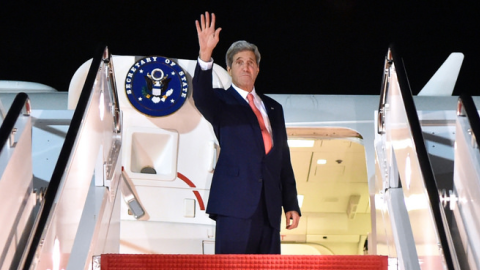Of the Gaza war's many dreadful features, the one that may have the most significant and long-lasting effect is the 36-hour ban U.S. authorities imposed this week on U.S. flights to and from Israel's main airport. How were U.S. interests served by isolating Israel just as terrorists are waging war in hopes of isolating it?
Federal Aviation Administration (FAA) officials justified the ban as a safety measure because a Hamas rocket penetrated Israel's Iron Dome defenses on Tuesday, July 22, and hit a building in a town near Ben Gurion Airport. FAA officials hardly needed to cut the Tel Aviv connection to assure themselves that Israel takes the security of Ben Gurion Airport seriously.
All things considered, it's not credible that FAA officials acted on their own, without regard to the potential foreign, defense, economic, and other effects. But if they did, it's malfeasance. The more reasonable assumption is that U.S. President Barack Obama and his top advisors authorized the ban because they thought it would aid their diplomacy with Israel and Hamas. That's a different type of malfeasance.
Imposed as Secretary of State John Kerry was arriving in Jerusalem to exhort a cease-fire, the ban loomed before Israelis as a threat of worse to come. That was desirable if one saw the war as Israel's fault, but Obama professes to believe that it's not and that Israel has the right to defend itself.
Kerry says his goal is to stop the fighting in Gaza, but that won't necessarily serve U.S. interests, which are to reduce Hamas's capabilities and its support from Palestinians and others. America also has an interest in deterring Hamas, after any cease-fire, from resuming its attacks (by rocket or otherwise) on Israel. And it's important that U.S. policy deter other groups in the world from resorting to terrorism.
A serious deterrence strategy would communicate that terrorism will cause its perpetrators to lose ground politically, not gain it. And that's what was wrong with this FAA ban. It helped Hamas, at home and abroad. Hamas's leaders started the war to isolate Israel, and here's the United States imposing one of the most isolating measures imaginable.
The message is that Hamas rocket attacks are valuable and will become even more so as Hamas improves its ability to target Israel's airports. It makes isolating Israel look not only possible, but easy. It emboldens Israel's Middle Eastern enemies and their comrades abroad in the so-called Boycott, Divestment and Sanctions movement, which strives to cut Israel's ties to the world. It paves the way for flight bans by others (the European Union promptly imposed a similar ban). It allows Hamas to help justify this rocket war. That is, the FAA ban rewarded the very activity that U.S. officials should be penalizing.
The ban will encourage not only future attacks on Ben Gurion Airport, but also on airports in Cairo, Amman, Istanbul, Jakarta, and Manila. Terrorists go to school on one another's operations. If one group can shut an airport down by shooting a rocket in its direction and hitting within a mile or two, then that's a big payoff for small effort.
The Wall Street Journal reports that, in hopes of a cease-fire, Kerry wants Israel's help in "assur[ing] Hamas that Gaza's economic interests would be addressed if the Islamist group stops rocket attacks." Under consideration is "[o]ffering Hamas incentives such as economic aid and freer movement of goods into Gaza and eased restrictions on movement." Kerry is treating Hamas as a respected authority deserving of sympathy, though his own State Department has long designated it as a terrorist organization.
Kerry seems unaware of the character of Hamas. It came into being in 1988 with the issuance of its Covenant, which identifies the group as "one of the links in the chain of the struggle against the Zionist invaders" since before Israel's birth. Affirming faith in the Prophet Mohammed, the Covenant quotes him as saying that the Day of Judgment will not come "until the Muslims fight against the Jews and the Muslims would kill them." Hamas members are committed to "raising the banner of Allah on every inch of Palestine" and declare in the Covenant, "There is no solution to the Palestinian Problem except by Jihad."
U.S. professional diplomats often belittle ideology, presuming that the principle-free pragmatism common among them is more or less a universal trait. But that's a mistake, especially regarding Hamas's leaders, who show sincere attachment to their Covenant. They conduct jihad to discredit, isolate, and eliminate Israel. They are devoted to Allah, to Islam, and to the reconquest of Palestine. Where they are insincere, as the rocket war makes plain, is in their professions of humanitarian concern for ordinary Palestinians.
Like U.S. soldiers, Israeli forces exert themselves to avoid harm to civilians. But Hamas commanders store and operate military equipment in civilian locations, such as the Wafa Hospital in Gaza's Shajaia district and in U.N.-run schools, as U.N. officials have admitted. They do this so Israel cannot defend itself without harming civilians. Hamas's leaders know what they're doing. Sacrificing their own civilians to destroy Israel and promote worldwide jihad is, in their view, moral, indeed noble. Propagandists exploit the heart-rending images and reports of the Arab casualties to stoke sympathy around the world for the anti-Zionist cause.
Hamas has long used suicide bombers. Is its war strategy a type of collective suicide bombing? No, it's worse than that. If a terrorist voluntarily kills himself to hurt his enemy, what he does is evil, but also idealistic (in a perverted way). What's happening now in Gaza is evil without even that perverted idealism. Having built expensive, elaborate underground structures to protect themselves, Hamas's leaders are turning Gaza's civilian population into involuntary victims. There's nothing idealistic about that. Hamas's leaders have interests in conflict with Israel and are serving those interests by causing their people to suffer and die. That's not idealism -- that's oppression.
The Palestinians live in appalling grief because their leaders for nearly a century have been undemocratic, corrupt, violent, and inhumane. The key to bettering their lives and making peace possible is not something that Israel can provide. Rather, it is decent Palestinians rising to oust the scoundrels in power. Weaker communities have overthrown more entrenched regimes.
U.S. officials should be devising incentives for a humane revolution in Palestinian politics. That's a worthy exertion. Shutting down Ben Gurion Airport isn't.
















